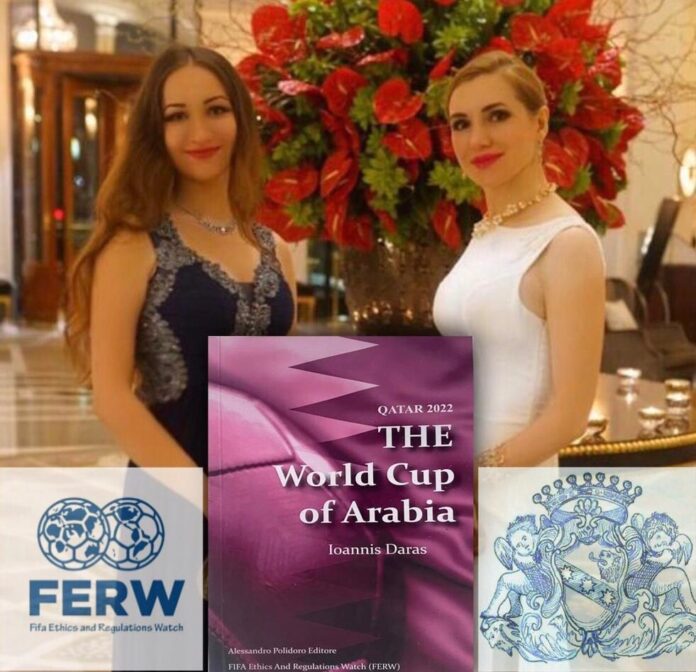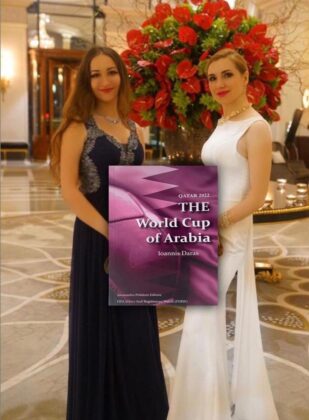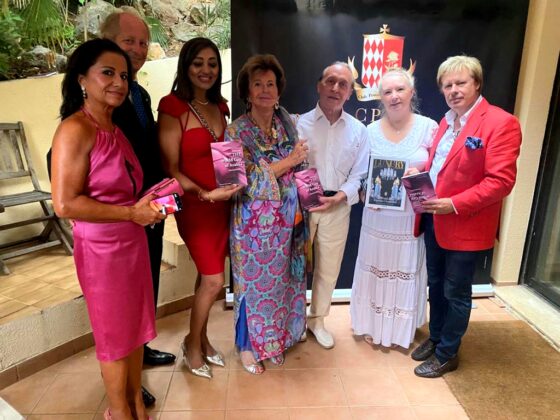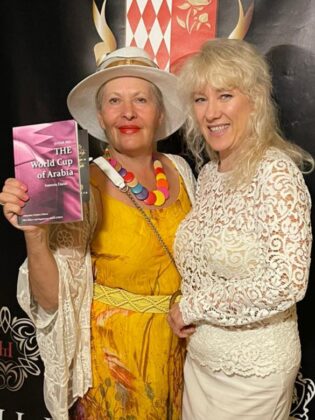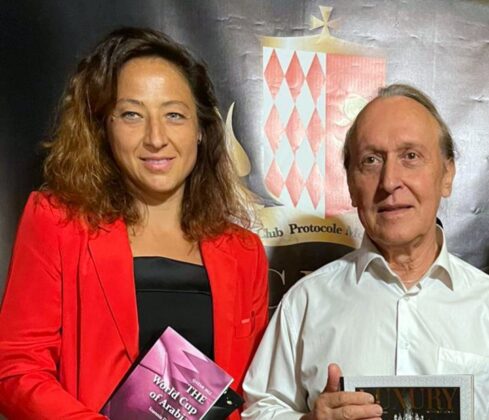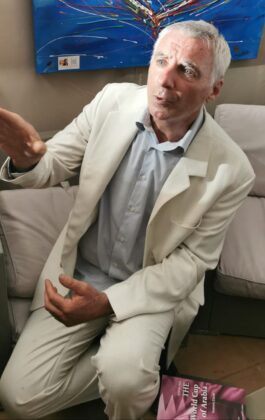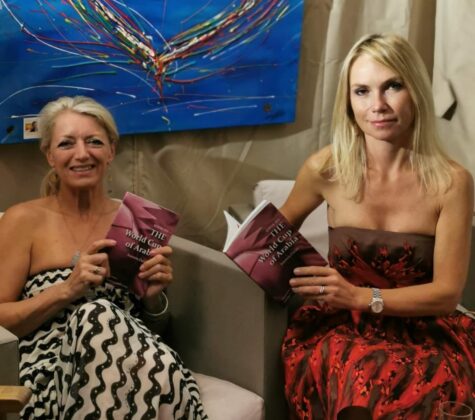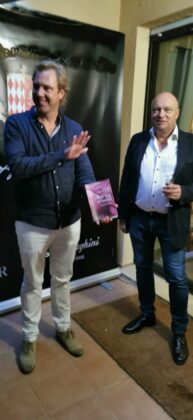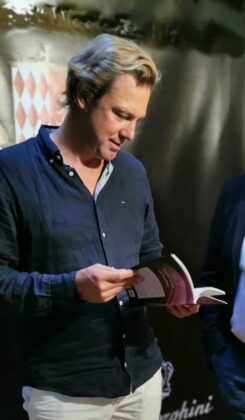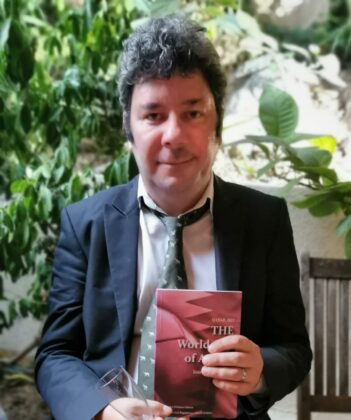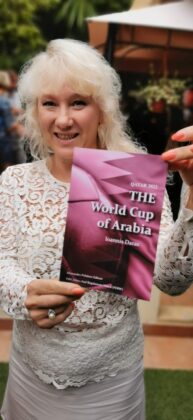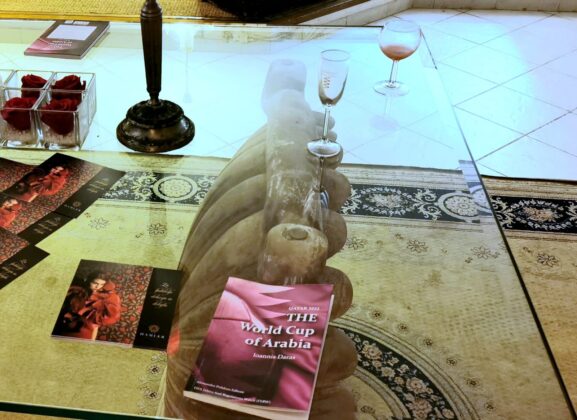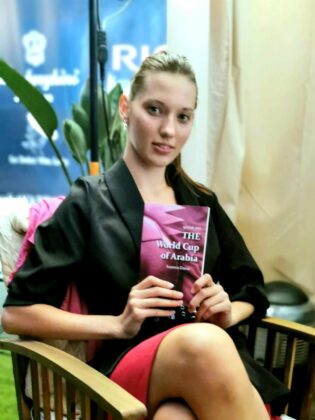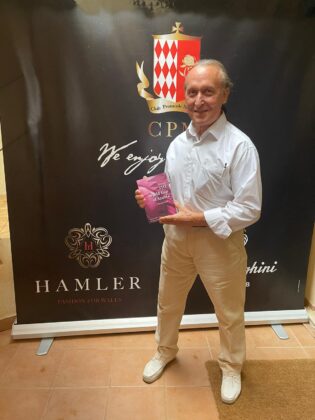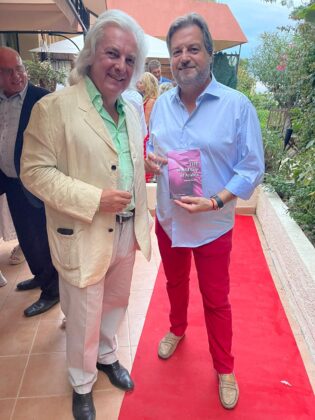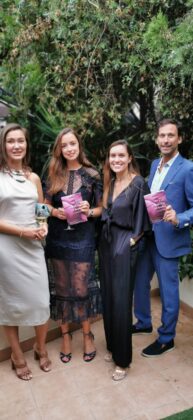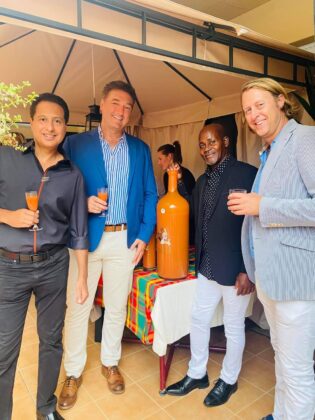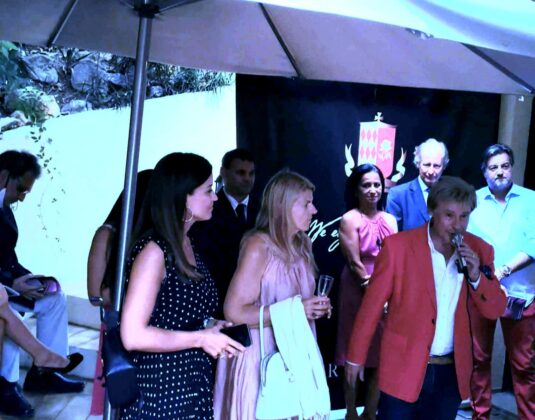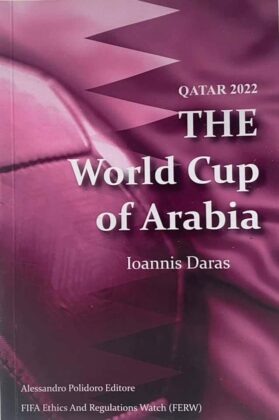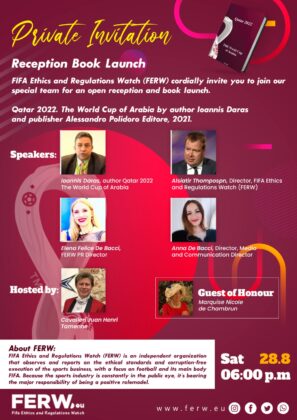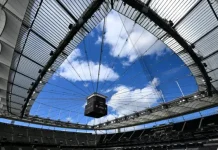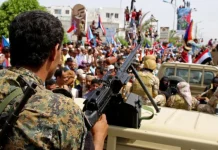The 2022 WORLD Cup in Qatar will rewrite the international community’s perception of the Middle East by showing that it is “open-minded, creative, passionate, curious, generous and kind”, a new book has claimed.
The book, Qatar 2022 The World Cup of Arabia, written by the award-winning journalist, Ioannis Daras, claims that next year’s world cup “…opens a rare window of opportunity to set the record straight and rehabilitate the Middle East’s much-abused reputation by taking to a world stage in full view of more than one billion people around the globe.”
“This event is a chance for the region to establish a modernist legacy and promote a more positive perception and understanding of the diversity of its inhabitants as people open-minded, creative, passionate, curious, generous and kind.”
It compares the Qatar World Cup with the rugby and football world cups in South Africa in 1995 and 2010, which it says, went a long way to offset a national image still sullied by the lingering aftermath, its notorious Apartheid regime and the associated horrors that spilt over to Namibia and Angola.”
It continues:
“Hosting the 2010 tournament offered South Africa and the entire continent a unique chance to present a new African order, consolidating the positive effects of the 1995 rugby World Cup. Once again, a major sports event advanced reconciliation and unity in Nelson Mandela’s new South Africa.
“The senior sports columnist Kevin Garside, of the London Daily Telegraph, summed it up aptly when, reporting on South Africa 2010 World Cup event, he noted how it went a long way towards removing ‘the veil of fear that blinds foreigners to the country’s appeal.’ Hosting the 2010 tournament turned out to be a unifying catalyst, that is, a ‘coming out party not only for South Africa but for a continent.’ The event has a lasting legacy for South Africa and for the continent as a while, bolstering tourism and foreign direct investments.”
Mr Daras, argues that the Qatar World Cup could have a similar effect for the whole Middle East, but only if all Qatar and its neighbours present a unified image.
“The day FIFA’s executive committee chose Qatar to host the World Cup of 2022, 2 December 2010, was preceded by a series of tragic events and significant setbacks in the Middle East that sowed an atmosphere of despair and devastation. This cycle of unfolding misfortune included the war in Iraq that broke out in 2003, in Lebanon (2006) and Gaza (2008), right up to the political collapse in Egypt. One tragic event after the other sustained the impression that the Middle East region was in freefall.
“Then, against all predictions, came the break-through moment, the surprise announcement that shocked friend and foe alike – Qatar had won the chance to invite the entire world to the Middle East, selected against all the odds to host the 2022 World Cup. Celebrities, dignitaries, investors, business people, football fans plus the entire world media would all be trekking to the region to take part in the world’s most popular sports event.”
He continued:
“Inviting the world to come to see and experience Arab hospitality, culture, and lifestyle is a sure-fire remedy guaranteed to dispel negative perceptions and prejudice. Making the Arab world more accessible and more relatable for foreign audiences would counter and reverse the undermining process of ‘otherisation’.”
The book includes chapters on the offering by Qatar, including regional reconciliation, the social and cultural potential for the tournament, planned infrastructure, the stadiums, efforts to offset the environmental impact and the planned legacy.
It was commissioned by the European arm of the sports think tank, FIFA Ethics & Regulations Watch (FERW), as part of a series of reviews and studies that hopes to explore the positive benefits of hosting mega-sporting and cultural events, including changes to human and worker rights, economic growth and the impact on a countries political system.
The first presentation of the book took place at the private Villa Vivaldi Monaco of the Chevalier Juan Henri Tamenne. The event was organized under the patronage of La Famiglia De Bacci, by FERW PR Director, Elena De Bacci, FERW Spokesperson and Communications Director, Anna De Bacci.
The presentation was attended by honoured guests: Her Royal Highness Marquise Nicole de Chambrun, Namira Salim, Astronaut and Co-Founder of Virgin Galactic.
Other notable attendees included: Chris Becker, Consul of Mozambique in Monaco, Amin Belahbib, Councillor Of Beausoleil City Hall and Mme Bintou, Carlo Carpi, Candidate for President of Liguria Region, Olesea Cubari Former Assistant at Embassy & Consulate of Moldova in Austria, Guéorgui Chichkine, Honourable Citizen of Monaco and prominent artist, Madame Raissa Romanova, Romanov Royal Family descendant and Professor, Evgenia Osokina, Owner of Luxury Magazine, Ivana Ilic-Labia, CEO of Luxury Magazine Vienna, Shalini Arora Kochhar, Founder of Mission Women On Top Monaco Magazine with a spouse Dave Hahnraths, Entrepreneur, Daniel Jean Marc Daniel, Entrepreneur, Martha Cortes, Entrepreneur, Alberto Mancini, Entrepreneur, Oleg Vorontzoff, Entrepreneur, Alex Cht Charlet, Entrepreneur, Courtney McConnel, American Author, Ying Vicky Jsc Ling, Chinese media presenter, Tony Hamler, Fashion designer, Inessa Malenko, Event Agency, Grégory Bakian, Producer, Dave van Dorst, Artist.
Welcoming greetings to guests were sent by His Excellency Theodor von de Wahl, Alfie Best, Top 500 UK Richest and Owner of FC East Thurrock, Bradley Chapman, Managing Director at Alfie Best Business, Victoria and Ernesto Marco, Owners of Luxury Magazine, Robert W. Sutton, Former Chairman of the Broward Republican Party, Peter Webster, Director at Thea Limited, Jianlin Wang, Bloomberg and Forbes Wealthiest Individuals, Cris Egger, Italian Aristocracy, Edmond Fokker van Crayestein, Harvard Business University Alumnus, Tony Taylor, Top Gospel Artist 2020 from Hollywood, Thomas Mis, Royal Gentlemen Club, Thomas Luigi Mastroianni, Expert of Royal Houses, Isabella Wang, Singer, Pajtim Sula, Foreign Ministry of Albania, Kulvinder Sethi, Honoured Citizen of Kuweit, Kristina Silfverskiöld, Swedish Aristocracy, GD Singh, Philanthropist, Entrepreneur, Author & World Peace Advocate, Eric Brundage, Owner of Monaco Life Magazine.
Anna De Bacci, FERW’s International Representative & Spokesperson commented:
“This is the first publication FERW have produced looking specifically at Qatar 2022. While it takes an optimistic look at the opportunities the World Cup creates both regionally and internationally, it recognises the considerable challenges of presenting a more positive picture of Islamic culture and society to a global audience of more than a billion football fans, especially given the turbulent and often violent past of recent years.
“But as globalisation continues and thanks in no part to the unremitting focus of the media, things are starting to change. Since the awarding of the tournament, we have seen a series of major reforms to workers and human rights in Qatar and other countries in the region appear to be following them. While no one would argue the situation is perfect, the reforms have been significant and positive.
“These changes lead us to ask the question, how should mega-sporting and cultural events be awarded in the future and how can we bake in a firm commitment to social reform and economic benefits, how can these be independently monitored and what are the sanctions should they not take place? These are important questions as next year in addition to Qatar 2022, we will also see the Winter Olympics hosted by Beijing, which has faced a huge amount of criticism due to their treatment of the Uyghur Muslims, environmental concerns and the reaction to protests in Hong Kong.”
Miss De Bacci concluded:
“FERW believes that the IOC and other sporting authorities have failed to support meaningful social change and have left this to the conscience of individual host countries and the world’s media to police. This perhaps explains why in smaller countries like Qatar we have seen a step-change, compared with larger countries like China, where reform still seems a very long way off.”
FERW will be publishing further reports and books looking at the history of mega sporting events, the economic benefits of the tournaments, its’ legacy and how sporting and cultural events can raise human and workers’ rights and how this must be integral to future bids from those countries wanting to host them.


